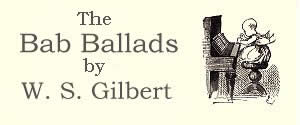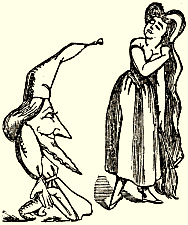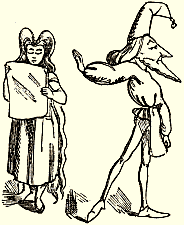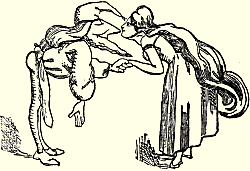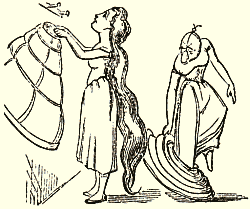You are here: > > The Baron Klopfzetterheim
The Baron Klopfzetterheim
or,
THE BEAUTIFUL BERTHA AND THE
BIG BAD BROTHERS OF BONN
Fun, V - 19th Mar. to 16 Apr. 1864
FYTTE THE FIRST
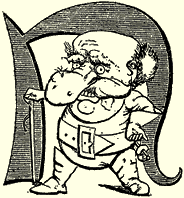 |
ear the town of St. Goar, |
|
| On the bleak Rhenish shore, | ||
| Dwelt a terrible Baron — a certain KLOPFZETTERHEIM | ||
| I've not got it pat, But it sounded like that, |
||
| Though whether it's properly spelt to the letter, I'm | ||
| Not at all sure; I Confess for this story |
||
| To memory (second-rate) only a debtor I'm. | ||
| Indulgence I claim, It's a high sounding name, |
||
| And a name, too, to which one can easily set a rhyme. | ||
| A growling an gruff 'un A ruthless and rough 'um |
|
| A tyrant, a Tartar, a toothless and tough 'un; His skull was as bald as the palm of my hand, And surrounding its base was a silvery band Of curly grey hair, and he brushed it well up |
|
| From ear round to ear, So it looked from the rear, |
|
| Like a very smooth egg in a very white cup. | |
| He'd bricks and he'd mortar, He'd wood and he'd water; |
|
| Sheep, oxen, and poultry, calves, pigs and — a daughter Whom, though generally such points rather lax on, he Swore was the loveliest woman in Saxony |
|
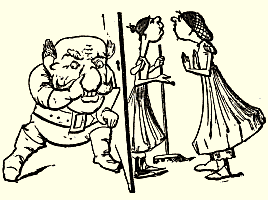 |
|
||||||||||||
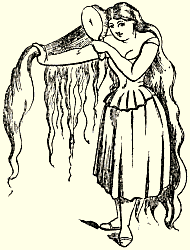 |
|
|||||||||||||||||||||||||||||||||||||||||||||
| Then her eyes! Their size! Their glorious blue! I'm sure it's a hue |
||
| That was solely invented our trials to leaven — You'll find it alone in girls' eyes and in heaven! |
||
| When nobody hailed them, She quietly veiled them, Humanely declining |
||
| To send you, by needlessly flashing their light at you, | ||
| Hopelessly pining; | ||
| But when you addressed her she always looked right at you — | ||
| Right in your face, With a maidenly grace, |
||
| That spoke to the truth an sincerity there, | ||
| And misconstrue that innocent gaze if you dare! | ||
| Now the Baron's old seneschal Finding the Rhenish all Swallowed, he hied |
|
| For some more to the marchand de vin, who replied "Friend, never of Rhenish the worth of a penny shall E'er again aid in his lordship's digestion, Unless he first pays down the penny in question. The Baron must think me as green as an olive! At all events he Ne'er will get more without cash down. At all events he Couldn't suppose I would act with such folly, ven, see" |
|
| (Opening his books With disheartening looks), |
|
| "I am tottering just on the brink of insolvency." | |
| So the seneschal thought It was time to report |
|
| To his master the crisis to which he was brought. | |
FYTTE THE SECOND
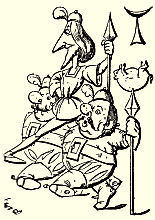 |
|
||||||||||||||||
| Now as RUPERT was eldest, and CARL was the second, And OTTO the youngest, I swear you'll have reckoned That RUPERT and CARL were, to say the least, quite on |
||
| A par, as to evil, With ROBERT the Devil |
||
| And OTTO a second edition of CRICHTON. | ||
| In legends we know That it always is so: |
||
| The eldest sons, villains unheard of are thought to be; The youngest, however, is just what he ought to be. |
||
| OTTO was graceful and slender and tall, While RUPERT and CARL were as round as a ball. OTTO was handsome and neat as a pin, While RUPERT and CARL were as ugly as sin. |
||
Now RUPERT and OTTO and CARL one day, |
||
| (For excellent OTTO Knew he ought not to |
||
| Drink anything stronger than curds an whey); They listened awhile to the gossiping host, |
||
| Who merrily told Of the miserly old |
||
| Baron KLOPFZETTERHEIM, rolling in gold — | ||
| Of his recent endeavour To get wine, and never |
||
| Pay nobody not even nothing whatever; | ||
| Telling them further, How nowhere on earth a |
||
| More opposite creature existed than BERTHA | ||
| (His amiable daughter), How lovely all thought her, |
||
| And how he drove off all the nobles who sought her. | ||
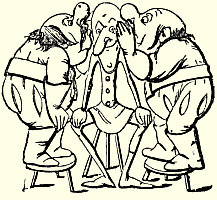 |
|
||||||||||||||||||
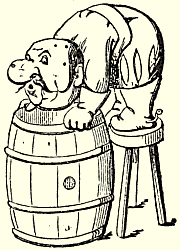 |
|
||||||||||||||||||||||||||||||
FYTTE THE THIRD
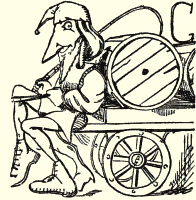 |
|
||||||||||||||||||
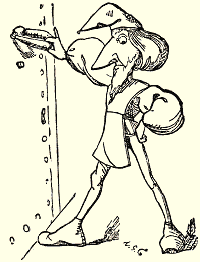 |
|
||||||||||||||||||||||||||
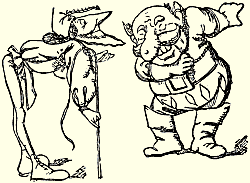 |
|
||||||||||||||||
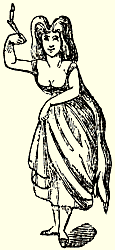 |
|
||||||||||||||||||||||||||||||
FYTTE THE FOURTH
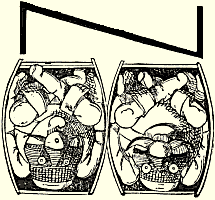 |
|
||||||||||
|
|
||||||||||||||||||||||||||||||||||||||||
FYTTE THE FIFTH
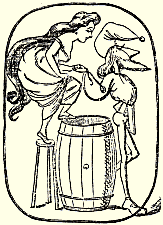 |
|
||||||||||||||||||||||||
|
|||||||||||||||||||||||||
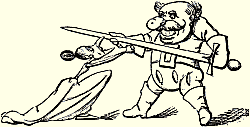 |
|
|||||||||||||||||||||
![]()
![]()
![]()
![]()
![]()
![]()
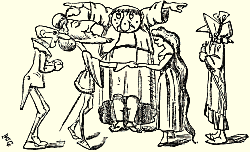 |
|
||||
| |
Page Created 29 July, 2011
